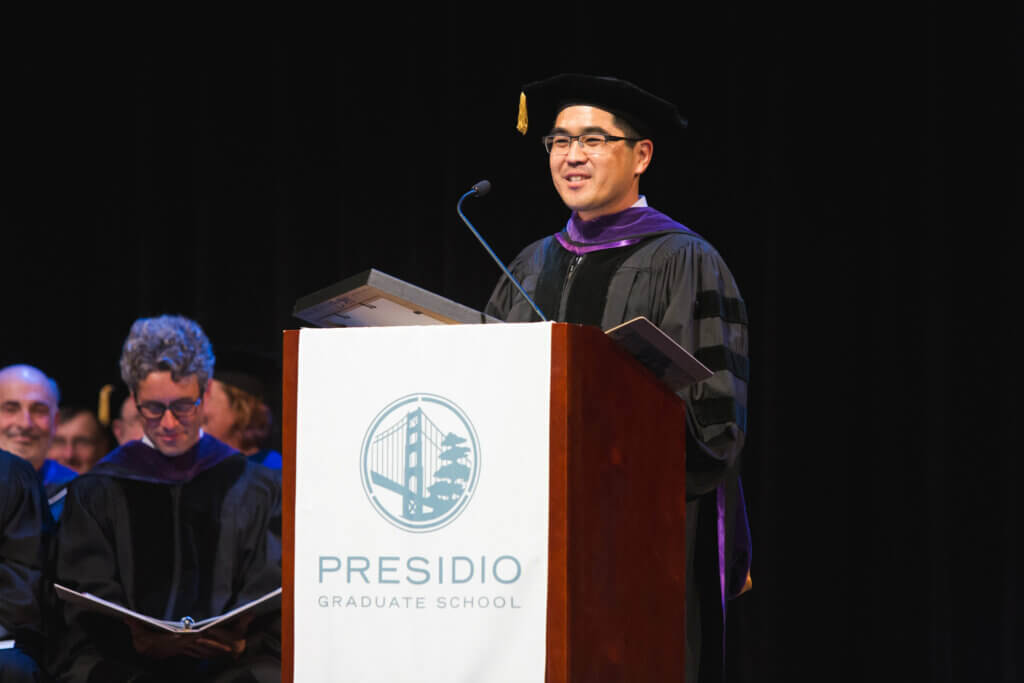Real training. Real experience.
We designed our innovative portfolio of degree programs and certificates to help you achieve your professional, educational, and personal goals, regardless of where you are in your career–and your life. Explore our programs and find your fit.
Presidio’s pioneering graduate and certificate programs in sustainable solutions and social justice are designed for those people who refuse to sit on the sidelines when they know they can make a difference. Our programs equip sustainability leaders to challenge the status quo and reimagine systems that have caused or perpetuated critical social and environmental issues.
Now located at the University of Redlands Marin Campus, Presidio offers state-of-the-art facilities, flexible hybrid instruction, and a strong emphasis on community-building through monthly Residencies designed to empower you for success. You’ll join a global network of passionate changemakers and climate leaders at Presidio.
Featured Programs

MBA in Sustainable Solutions
Designed to help you integrate sustainability and social justice practices to lead businesses toward the common good.
No GMAT/GRE is required, and generous scholarships are available.

Dual MBA/MPA in Sustainable Solutions
Develop the skills to design and implement solutions to sustainability and social justice challenges at the intersection of the public and private sectors.
No GMAT/GRE is required, and generous scholarships are available.

Sustainable Management Certificate with Concentrations
Suited for professionals and leaders who may already have a graduate degree and/or professional experience but are looking to evolve their toolkit with the latest research and methods in sustainable practice.
Choose from:
Concentration in Sustainability Leadership
Concentration in Sustainable Operations
Concentration in Sustainable Marketing Strategy
Concentration in Sustainable Economics and Finance
Open Concentration where you design your own based on professional goals.
Our Approach
At Presidio Graduate School, we embrace the tension between equipping students for success in today’s world and creating the disruption necessary to bring about a better future. Our students learn current industry leadership best practices, but that’s only the beginning. By addressing the big, bold challenges of our time, classrooms at Presidio become incubators for transformative ideas, unexplored possibilities, and effective action plans.
We don’t separate theory and practice in our classes; we combine them. Pragmatism and optimism work together to form lasting solutions that get us closer to a more sustainable, equitable world. That’s why our curriculum is outcome-focused and organized around systems thinking, responsible and inclusive leadership, and professional skills and tools.
We believe that truly transformative ideas can be found by following the path of pragmatic inquiry—experience disciplined by reflection. Our students learn to balance continuous testing of on-the-ground experience against high-level theory.
Experiential Learning
Through our experiential learning program, you’ll work in teams with your classmates to help a company, nonprofit, or government agency that partners with Presidio to help identify and implement strategies to manage its operations, marketing, or strategy more sustainably and effectively. You’ll develop concrete solutions to meet the organization’s specific needs and challenges, applying what you learn in the classroom to have a tangible impact.
Systems Thinking
Systems thinking is an approach to problem-solving that embraces complexity. Focusing on wholes, not parts, and viewing each situation as a set of elements that interact to produce predictable outcomes. Systems thinking is extremely effective in approaching complex issues that reoccur, that have been made worse by past “solutions,” or that are influenced by outside forces such as the natural, social, or competitive environment.
Systems thinking allows leaders and managers to both see and solve the problems that those trained in reductionist theory tend not to see—much less solve.


